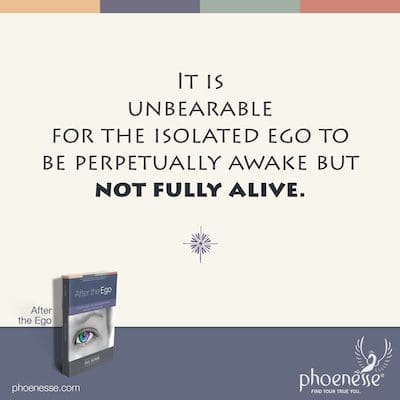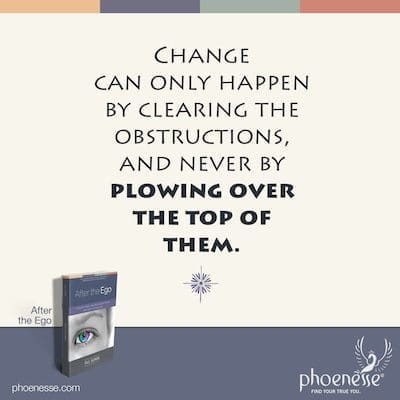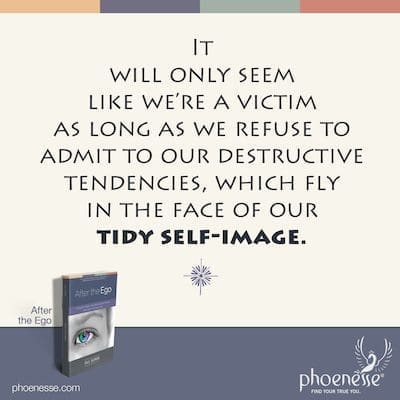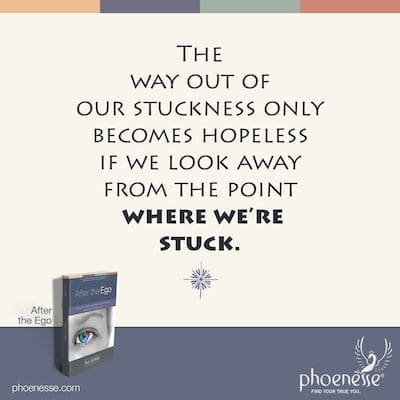We have been looking at the relationship between our ego-consciousness and universal intelligence. When we are primarily functioning from our ego, we are going to be out of balance and mired in problems. We can also turn this around and state that if we have inner problems, we will inevitably be unbalanced and enmeshed in outer conflicts. No matter which direction we come at this from, it always adds up the same: The ego has to learn to let go of itself. So let’s talk about surrendering.

A boatload of intellectual knowledge about the role the limited ego plays relative to the Real Self won’t help us much. We must find a new approach inside ourselves that makes it possible to let go in a healthy, harmonious way. Let’s shed some new light on this important topic.
Why the ego must learn to let go
When the ego operates in a vacuum, without replenishing itself at the inner source where our life force flows freely, it dries up, starves and withers. Literally, if left to handle the business of living without the benefit of support from the Real Self, the ego dies off. This shines a new light on the process of death, looking at it from this point of view.
This source of life is the universal self that dwells at the heart of every soul. When we incarnate, our spiritual being condenses into the coarse matter that makes up this material world. Such a condensation into matter happens because a separated part of the overall consciousness—the part we call the ego—is disconnected from the whole, from the universal self. This disconnectedness causes the ego state, which in turn results in this material life. And that is how we come to this experience of the cycles of life and death.
If any of us overcomes separation, we release ourselves from the process of dying. When we no longer fear letting go of ourselves—from our ego—a reconnection with the universal forces becomes possible. This is not something to hope for in the hereafter. It can take place at any time, in any place, since it’s a question of our state of consciousness.
Three replenishing states
One of the ways we regularly replenish ourselves is by entering into the state we call sleep. If we are unable to sleep—if we experience insomnia—this is a sign that we are enmeshed in our ego and therefore deeply troubled. Since the ego is too predominant, we can’t relinquish ourselves to the involuntary forces of life. Our ego is hindering us by not letting go of the reins.
We may not be conscious that this is what we’re doing, but nonetheless, we’re doing this. If we fear and reject the forces of the Real Self, we will block off the automatic and temporary ways we submerge into it. Sleep, then, is a state that lets the ego rest from tensions and chores. There is a particular strength that we gain from this immersion into the divine ocean of being. But if our ego is overactive, sleep can’t come and we miss out on this most primitive and universal form of rejuvenation.
Another state that replenishes us is mutual love. When we let go through intense, healthy self-forgetting, we dip into the vast sea of beauty and universal power. This happens when we accept and merge with another “sphere,” or person. By melting into another being, we make ourselves compatible with the universal life force, and have an experience that fills every level of our being: mental, physical, emotional and spiritual. Therefore, a loving sexual connection is the most complete spiritual experience we can have.
By partaking of our Real Self, we are nourished by this creative substance in all its splendor. By letting go, the ego becomes temporarily immersed, resulting in a temporary release of its duties. But it reemerges stronger and better than before! The ego actually becomes wiser and more flexible, and filled up with pleasure. Once it has dipped into this heavenly ocean, the ego will be forever changed.
The ego not only is incredibly enriched, but its capacity to surrender and remain submerged in bliss—to be in love and in truth—expands proportionately. This intense melding of the ego with another is the most effective way for us to forget and transcend ourselves.
Another replenishing state is meditation. This is not a mental exercise, but a complete giving up of ourselves to the divine intelligence. We must do this to resolve specific issues, rather than in a general way. Wherever our personal hurdles—which often include fear—bar the door to our Real Self, meditating on them can help. If it is too easy, we are likely deceiving ourselves.
When we are able to overcome these hurdles—because our love of truth is greater than our attachment to our errors—we can surrender into the sea of wisdom that will revive and enliven us. As we drink in the truth, new wisdom can open many other inner doors as well.
In each of these instances, the ego gives itself up and then partakes of something greater inside. In a healthy life, ideally we are able to pursue and enjoy all of these experiences regularly. We create the possibility for this through our readiness, right attitude and engagement with life. When this happens, our whole life will eventually be activated by our greater Real Self, until it and our ego are one.
At that point, this greater intelligence takes over our lives, allowing the ego to flow and become flexible. We can relax, permeated with the knowledge, pleasure and power of our true spiritual being. Everything we do, no matter how mundane, can now be infused with the Real Self which operates freely, on its own. We won’t need any effort to contact our Real Self, as there will no longer be fear or resistance to overcome. The more this takes place—we let go and merge with our Real Self—the more we will feel replenished.
What stops all this from happening are the inner obstructions our ego is not willing to remove. To whatever extent this is the case, life dries out and death creeps in. When we become completely dried out, physical death is the natural end result. So the cause of death? The separation of our own ego-self from our deeper, greater self.

Unhealthy ways to let go
Ready to go a step further? Let’s look more closely at the reasons that the very thing that gives us life frightens us so. Why do we react the way we do, believing connection with the source of all life will annihilate us? What makes us insist on believing—either consciously or blindly—the kind of enlivening experiences we’re talking about are dangerous? Why do we refuse to abandon control through our ego, and immerse ourselves in a vast sea of eternal consciousness and divine laws? Why do we stop ourselves and hinder all this?
For no matter how frantically we strive on the surface, underneath we are the life blockers. Perhaps, we think, I’m just not made that way. Not so. Longing for this contact can never be wiped out from the human heart, regardless how much conflict and confusion and fear there is. So what is it that causes us to cling to the attitudes that sink our chance getting replenishment at the source, given the way this dries out the psyche and leads to death while making life unpleasant and bleak? Where did we get the idea that an ego-driven life is safe and preferred?
It’s puzzling, right? In various other lectures, we’ve already pried open the lid on this a bit, and discovered some of the reasons—pseudo-reasons, really—we think have to protect ourselves from the exact thing that makes us alive and bright with well-being. We’ve looked at the shortsighted, wrong conclusions and defeatism that makes people so destructive we’d rather give up our life than “give in,” or at least that’s how it seems to us.
But now we have come to the place that everyone must eventually arrive at on their spiritual sojourn, where we stand at an extremely important threshold we must get across on our evolutionary journey.
Before we dive in, there’s something to re-emphasize along these lines. Our need to let go of our ego is so great that when the fearful, distorted part of our personality faces this natural process, it will go in search of an unnatural way around. That’s why so many people seek out the solace of drugs. That’s why a person who can’t sleep will search for a pill to take instead of doing the more difficult task of removing whatever blocks the ego in order to conquer the real problem.
Fear and inner distortions are also the reason a person whose ego has predominant control—and therefore they are not receiving sufficient replenishment—pursues self-destructive aims. To engage in self-destructive acts is to walk with death. We’re courting it, and hastening our pace of reaching it. For when all other avenues for gaining relief fail, death becomes the great release we’re looking for. We’d rather die than give up our false idea.
Our stubborn refusal to uncover the truth and all the self-destructive habits we resort to instead are essentially slow forms of suicide. To the same extent we fear death, we must also unconsciously long for it. And that longing stems from how unbearable it is for the isolated ego to be perpetually awake but not fully alive. So we are an ambivalent bunch.
On one hand, we fear letting go of our ego in a healthy way, while on the other hand, we’re running headlong into unhealthy ways to let go. This is one of the dualities we must live with if we insist on staying separate.
Now it’s time to look at the fundamental reason we fear the healthy state of letting go and allowing our Real Self to “live us,” as it were. Why can’t we trust this greater wisdom and more well-organized divine inner being? Let’s lift the reasons out of the depths of our unconscious where they are resting for most of us. For we must see what’s going on in the clear light of day. Otherwise, we’ll end up trying to force ourselves to change before we’re really clear about what’s going on with our destructive attitudes. And nothing real can be accomplished that way. Change can only happen by clearing the obstructions, and never by plowing over the top of them.

The root cause of not surrendering
Here’s the root cause of this condition so many are in, where the ego has primary control: There is a spiritual law that makes it hazardous for the ego to let go, if the ego is hanging onto attitudes that are incompatible with the laws of the Real Self. That’s the key. So anywhere we insist on our destructive ways, it will be simply impossible to let go of our ego in a safe, healthy way.
And what are the healthy attitudes the ego needs to adopt? It must be loving, generous and open, as well as trusting, realistic and able to assert itself. These are the qualities we find in the greater reality and in the divine laws upon which the universe operates. To violate our Real Self is to hate and be weak, nurturing our separation, illusions and lack of trust. We’ll have a tendency to damage ourselves instead of care for ourselves and act in ways that go against our best interests.
To live with such an unhealthy ego is to strive for the opposite of what it means to be divine. We won’t be equipped to care for ourselves, so life will be fraught with fear. Insecurity will become our constant companion. Without having support from anything of real substance, the ego will long to escape from tension and perpetual unpleasantness, and if it gets bad enough, may choose to liberate itself through insanity.
What does it look like to be destructive? We don’t wish to be positive, to give our best in the areas where we are unhappy and in conflict. We refuse to see that we are the ones blocking fulfillment. And our lack of awareness makes it impossible to step across the threshold.
So it’s imperative we start to see how we are being destructive. To do this, we can adopt the stance of the objective observer, seeing ourselves in a somewhat detached way for a while. Such self-evaluation will require a certain amount of self-acceptance and a determination to give up our illusions. We must also stop with all the self-glorification, pretending to be more than we are.
While much of the ego is conscious—we are aware of our behaviors—the ego also has an unconscious side. If the unconscious part of the ego attaches to a destructive attitude, this part is not compatible with the forces of the Real Self. Therefore, when such an ego lets go, there’s no net. It’s unsupported. It can find nothing to hold onto and becomes completely disorganized.
So an ego that is not guided and inspired by the Real Self can’t cope with anything. It becomes completely disassociated from any intelligence. One could even say such an ego was “right” to not let go. For that’s no way to live.
For as long as we refuse to give up our destructiveness, the ego must hold on if we want to retain some modicum of sanity. It’s better, after all, to have an exaggerated sense of self, caused by an inflated ego, than it is to disintegrate. If the Real Self is not to be trusted, the ego that gives itself up has nothing to rely on. So if we don’t trust the greater intelligence, we’re left with the limited intelligence, limited logic and limited lawfulness of the ego realm. And that’s not nothing. No matter how limited the separated ego mind is compared with the greater self, it still has some reasoning ability and limited grasp of reality. And let’s face it, without the will of the ego, the divine will—even though it’s greater—can’t function either.
So there you have it, the reason we have so much fear about letting go. With this understanding, we can look at our lives from a different perspective. Namely, if we feel like we can’t let go, that means we have some destructive forces running wild inside. Somewhere within, we have a will that wants to be destructive. This will means serious business. There is not some random force making us be destructive against our own will. No, we ourselves are the destroyer.
It will only seem like we’re a victim as long as we refuse to admit to our destructive tendencies, which fly in the face of our tidy self-image. It’s actually this destructiveness that’s making us fearful and insecure, since we don’t want to see it, let alone part with it. Seeing the situation from this perspective will help us eliminate self-delusion. And that alone will go a long way in lessening our destructiveness. Admittedly, we will still want to be destructive in certain areas, but it’s good to be able to claim a little progress where we can.
The truth about destructiveness
What does it look like to be destructive? It may not be as bold and obvious as we might think. Often, it happens in the subtle way the ego clings to staying separate. Maybe we don’t want to expand and be loving or kind. Perhaps we’re vindictive, punishing others with our own suffering. Sickness can be one way to do this. Such vague, fleeting attitudes can be hard to catch. They can be so elusive, they almost seem non-existent. Until one day we get a glimpse, and then it becomes hard to “unsee” them. Then they become quite distinct, like a relief map that rises up and shows us the real lay of the land.
Perhaps we think, in the destructive corners of our mind, that no one really knows what we think and feel. Therefore, it doesn’t really count. Right? This is a widespread attitude to our less desirable tendencies. We like to gloss over them, believing that by keeping them secret, they become invalid.
To go one further, we feel it is a gross injustice if our little pet destructive attitudes hidden in our inner closets produce any outer effect. “No one knew what I felt, only what I pretended to feel! And if I felt as I pretended to feel, it would be unjust for others to react the way they do.” Buried in this thinking lies the illusion that life can be cheated.
This reflects the attitude so many have about life. It tells the story of how we often don’t give ourselves honestly to this business of living, but make pretend appearances by which we hope to be judged and accordingly reap the fine rewards. Under these circumstances, kidding ourselves that life really could work this way, it becomes impossible for us to trust in life.
We must catch ourselves in action and see how we don’t take life seriously, how we don’t lend our best to life and whatever we do. To catch ourselves in action like this—to reveal our little hidden dishonesties—is a constructive activity that is compatible with our Real Self. It can start the minute we begin to say inside: “I want to give my best to this process of living. I want to contribute the very best forces within me. Wherever I don’t do this and I’m too blind to see what I’m up to, I want my Real Self to guide me—to help me become aware. I wish to pay attention to what I am really doing.” With a sincere attitude like this, we set something new into motion, right at the very instant we utter such positive thoughts.
The places to look are in the problem areas of our lives. Our daily difficulties hold our work and this approach holds the key to unlock our troubles. The more we cultivate an attitude like this, the more our ego becomes compatible with our Real Self. This reduces the fear of letting go of the ego in direct proportion to our sincerity. For it gives us something larger and more reliable to trust.
By calling upon the will of the divine, we will convince ourselves that the divine really exists, because we will personally experience its wisdom and utter goodness. If we access our Real Self, we can’t help but discover its warm embrace of loving kindness that knows no conflict. Divine will works towards the good of all, creating fulfillment for everyone. This undivided intelligence is deeply safe and profoundly trustworthy.
But as long as the aims of our ego are diametrically opposed to divine will and spiritual laws, how can we trust it? How can we align with what we oppose? So when we feel shaky and insecure, scared and anxious inside—when we believe we don’t matter—we must harbor a destructive attitude. There is a negativity in us that we aren’t yet willing to give up.
Any time we feel anxious we can ask ourselves: “Where is my destructiveness? Where is my negativity? Where do I refuse to give of the divinity inside myself?
Loving isn’t the answer?
In the final analysis, the basic virtues taught in so many religions should amount to happiness. For truly, if we boil everything down to the very last, central point, it’s always a question of love. But by preaching this for thousands of years, few people have gotten anywhere. Knowing that love is the key to the universe has never really helped anyone. Often, people jus become more hypocritical.
Instead of doing the transformative work of unraveling their destructiveness, people have deluded themselves into believing they are loving, while underneath the surface they are not. They have covered over any feelings that are the opposite of love, and adorned themselves with a superficial veneer that gives the appearance of love. Such cover-ups are nothing more than self-deception, and most of the time others are not fooled.
How often do we claim that our biggest weakness is that we love so much? Meanwhile, we inwardly seethe with resentment and spite. We claim that the reason we’re so possessive and dominating is that we love. But inwardly, we want full control so we can win and have our own way. We claim that our arrogant, unhealthy pride is self-love, but really we just want to be better than everyone else and not have to give them an inch.
These are the self-deceptions we must unmask. Even after we’ve made significant progress on our spiritual path, we can still be blind to such areas in ourselves. Any time we blindly hold onto such self-deceptions, it’s a sign we don’t want to give of ourselves. And that’s a flagrant violation of the law of love. It’s this violation that ultimately ails anyone who is troubled.
This is what we must sniff out if we are suffering from unhappiness. “Where do I violate the law of love? How do I hold myself back and remain separated? When do I lack integrity, either with out-and-out lies or more subtle lies of omission? Where am I deluding myself? Where do I refuse to give, and refuse to budge?” These are important questions that we must ask, and we must answer. And the answer may lie in another direction from what we expect. What’s true may be different from what we thought.
To live from our ego is to be trapped in insecurity, creating an insufficient life that is painfully limited. What a frightening reality. No one really wants their life to end. But alas, the separated ego must end. Only by struggling to find our way back to our Real Self, where we are once again in alignment with the law of love and also the law of truth, can our ego safely give itself up, and become one with the divine.

How to become unstuck
It’s up to us to make the choice to continue to align with the negative. Do we want to continue to indulge ourselves in our resentments and self-pity, in building cases against others, and in the illusion that we are the injured party? All this gives us a certain a pleasure that we are reluctant to give up. Yet the price we pay for these luxuries is high, indeed.
As long as we choose this kind of pleasure—and all the pain, guilt and insecurity that comes with it—we forfeit feeling good. And feeling good is our birthright. But as long as we cherish feeling bad, feeling good will seem frightening. If, however, we give up our claim that we are a victim—which fuels our self-pity, resentments and blame of everyone whom we make responsible for our rotten lot in life—we will no longer fear good feelings.
If we clear away our negativity, then our trust will automatically be restored. It operates just like a see-saw. Let’s look at self-dislike, for example. It doesn’t work to just say we are done with this. Attempts such as this are sure to fail. But to whatever extent we remove the justified reasons we don’t like ourselves, the self-dislike will stop, all by itself.
It’s the same with trust. We will automatically begin to trust when we uncover the justified reasons for not trusting ourselves. For the universal life force is continually working to reestablish balance.
The best thing to do is to strengthen ourselves daily in meditation. We can say into ourselves: “I want to give up my destructiveness. If I can’t do this yet, I ask my Real Self to help me see where I’m stuck, and help me out of the quagmire. This is what I really and truly want.” Now, if we feel that in fact we don’t want this, let’s not gloss over this. For it is crucial to see and understand this obstacle.
This, then, becomes our new point of departure. From here we can say: “I want to discover why I don’t want the good. What is stopping me from wanting good feelings?” In whatever area we find blocks, we can say: “I wish I could want this. What’s stopping me? I want to give my best to seeing where and why I am stuck.”
This is the way out of our stuckness. The way only becomes hopeless if we look away from the point where we’re stuck.
Perhaps we notice that we flat-out dislike everyone. What’s the way forward in this situation? First, we must realize that dislike of other people—which inevitably is wound up with a basic dislike for ourselves—is also a question of distrust. One possible area to explore is our tendency toward dramatization and over-exaggeration. We sometimes assume that what’s happening to us is so bad, there are no redeeming circumstances possible. But we’ve exaggerated our bad situation and distorted it a hundredfold.
We now need to look at everything that has hurt us in the past—as far back as we can remember—as well as in the present, and see it with fresh eyes. Perhaps there’s another meaning than the one we automatically assume. We see everything as though its locked and unchangeable, with no possible outcome that’s not devastating.
It’s our attitude that needs changing, along with our desire for seeing a better reality. We think we are seeing the whole situation, but from the purview of our ego, we are looking at a limited slice. We can ask: “Is this the whole truth? Could there be other aspects I am ignoring because I have closed myself off?”
We can also ask ourselves: “Do I want to like people?” Maybe our mind says we need to like people, but we resist. Just by becoming aware of such an inner conflict will take us many miles along our spiritual path. And awareness is a required prerequisite for making our way out of our suffering. Awareness then is necessary for seeing the side that says No.
With this realization of our inner No, we can ask: “Why not?” Instead of coming up with a general theory, it will be much more helpful if we can come up with a specific answer that truly applies to us. Consider taking a new approach to understanding why we don’t wish to like people. Let the childish, illogical, irrational answers come forth. Allow anything that comes forth to have some space. This is the way to discover the real truth about our inner No.
It’s the same for anyone: Before we can develop our capacity to love, we must first become willing to love. For if we lack that essential willingness, there is nothing that can be done. Willingness is truly the crux of the matter, and it has to exist on all levels for our loving to be whole. If it only exists on the surface, our relationships will also only go an inch deep.
What we often do instead is ignore the fact that we are unwilling to love—we’re unaware of our hidden inner No—and then complain mercilessly about the results. We’re a victim, we cry! We waste tons of energy on complaining and feeling like a victim, energy we could be using to look for why we don’t want to love. We find ourselves locked in a vicious circle, projecting our ills onto the world and not realizing that we hold the key.
With this key, however, we can start to understand our loneliness and give up our belief that fate is playing a horrible trick on us. What a wonderful relief. But no one can give us the answers from outside. The truth can only come from within. Fortunately, that is entirely possible.
Our destructiveness and misunderstandings about life hang onto us only because we hang onto them. Once they’re out in the open, it’s relatively easy to overcome them. Such a transition is the most significant thing that could even happen in our lives. There is absolutely nothing that could ever equal this process.
Those of us who lack the courage to look at ourselves in truth—to give up our illusions—can’t reach this transition. We can’t abandon something we don’t know we have. We can’t give up a destructiveness we deny exists in us.
Truth will bring us to love, and love without truth is not possible. These are indeed one.
There is a tremendous power available to us, and it becomes more and more available the more we tap into it. It’s not dependent on anyone else, since it flows from the center of our being. It will flow and nourish us wherever we have freed ourselves from the shackles of ego domination.
“Be blessed, body, soul and mind. All of you, be penetrated with the love and the truth of the universe, so that they can help liberate you. Be in peace, be in God!”
–The Pathwork Guide

Next Chapter
Return to After the Ego Contents

